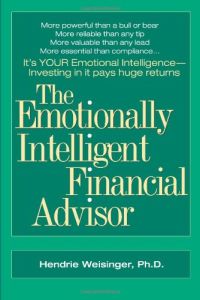Join getAbstract to access the summary!

Join getAbstract to access the summary!
Hendrie Weisinger
The Emotionally Intelligent Financial Advisor
Kaplan Publishing, 2004
What's inside?
Financial advisors who understand their clients' emotions – and their own – have an extra tool for making money.
Recommendation
Psychologist Hendrie Weisinger has written an interesting short book that applies the fundamental concepts of emotional intelligence to the work of being a financial advisor, although some of the advice might apply to many other professional roles. The author avoids academic psychobabble, and presents ideas and techniques that financial advisors (and others) can adapt to their everyday work lives. Whether professionals can fundamentally alter their behavior simply by reading a book remains to be seen, but the author tries to put that goal in reach by presenting reasonable, sound ways to apply his advice. His terminology and counsel are engaging, though not novel. How much you learn probably depends on how committed you are to mastering your emotional reactions. Can you remain focused through difficult times? Do you deal well with irate clients? Do you respond productively to criticism? Are your interoffice relationships cordial and fruitful? Can you turn setbacks into comebacks? Do you stay motivated over the long haul? This book can help you answer those questions positively, so getAbstract recommends it highly to those financial advisors who are not already familiar with this level of motivational literature. Most likely, just reading it is a sign of emotional intelligence.
Summary
About the Author
Psychologist Hendrie Weisinger, Ph.D., is a financial institution consultant and a frequently quoted expert on the use of emotional intelligence. He has taught at many business schools, including the University of Pennsylvania’s Wharton School, and is a frequent speaker for the Securities Industry Association and the Wharton-Securities Industry Institute.

















Comment on this summary